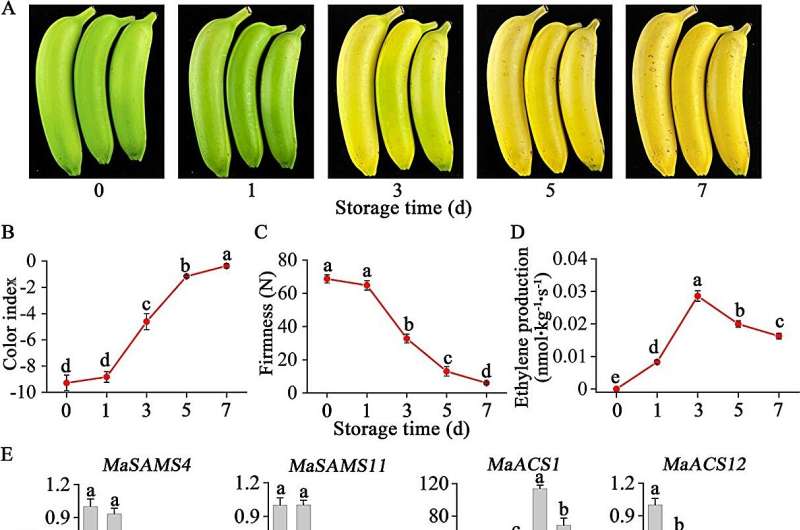This article has been reviewed according to Science X's editorial process and policies. Editors have highlighted the following attributes while ensuring the content's credibility:
fact-checked
peer-reviewed publication
proofread
Deciphering the ethylene biosynthesis puzzle in banana fruit ripening

Ethylene, a key phytohormone, plays a vital role in the ripening of climacteric fruits like bananas, with its biosynthesis being a focal point of agricultural research due to its impact on fruit quality and shelf life. Transcription factors(TFs), such as MADS and NAC, can regulate ACC synthase (ACS) and ACC oxidase (ACO), which are crucial enzymes in ethylene synthesis, to control fruit ripening.
Despite the extensive investigation into the transcriptional regulation of ethylene biosynthesis genes in bananas, a major gap remains in understanding the intricate network of upstream TFs and their cascading effects on this pathway.
In September 2023, Horticulture Research published an article titled by "MaMADS1–MaNAC083 transcriptional regulatory cascade regulates ethylene biosynthesis during banana fruit ripening."
Initially, researchers employed RNA-seq analysis of banana fruit across different stages, identifying key genes such as MaACS1 and several ACO genes whose expressions were upregulated in ripening. Furthermore, the study investigated the regulatory mechanisms of ethylene biosynthesis genes through yeast one-hybrid screenings and electrophoretic mobility shift assays, pinpointing that MaNAC083 can directly bind to their promoters.
During ripening, the mRNA level of MaNAC083 decreased, the transient overexpression or silencing of MaNAC083 in banana fruits resulted in slower ripening and reduced ethylene production, establishing MaNAC083 as a negative regulator of ethylene biosynthesis.
Parallel investigations focused on MaMADS1, a transcription factor that directly targets the MaNAC083 promoter clarified by Y1H and EMSA. It promotes ethylene biosynthesis by repressing MaNAC083, thereby facilitating ripening. This intricate interplay between MaMADS1 and MaNAC083 forms a transcriptional cascade that impacts ethylene biosynthesis genes, underscoring a complex regulatory mechanism controlling banana ripening.
Overall, through identifying and characterizing the roles of MaMADS1 and MaNAC083 in regulating ethylene biosynthesis, this research provides a foundational model for further exploration of fruit ripening processes and offers avenues for the development of strategies aimed at extending shelf life and improving fruit quality.
More information: Wei Wei et al, MaMADS1–MaNAC083 transcriptional regulatory cascade regulates ethylene biosynthesis during banana fruit ripening, Horticulture Research (2023). DOI: 10.1093/hr/uhad177
Journal information: Horticulture Research
Provided by BioDesign Research



















